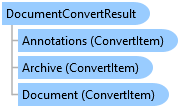| Leadtools.Documents Namespace : DocumentConvertResult Object |

function Leadtools.Documents.DocumentConvertResult()
DocumentConvertResult is the result of calling Document.Convert. Each member is of type ConvertItem which contains the URL to and the MIME type and file length of an output conversion file. The values are dependent on whether the output format set in DocumentConverterJobData object passed to Convert supports multi-pages. If the format does, then DocumentConvertResult.Archive is not used and the result document can be obtained through DocumentConvertResult.Document. If the format does not, then the output files are compressed into a ZIP file and its properties set in Archive This occurs only if the if the conversion results in more than one file (if the input document contains more than a single page).
For example, if the user selected a document format using DocumentConverterJobData.DocumentFormat that supports multiple pages, such as DocumentFormat.Pdf or DocumentFormat.Docx, then Archive is not used. Instead the final document is stored in Document and the user can retrieve this document using Document.Url. The name of document will be DocumentConverterJobData.DocumentName plus the common extension of the output format (for instance, .pdf for PDF files and .docx for DOCX files).
If the user selected a document format that does not support multiple pages, such as SVG, then the archive is used if the conversion results in multiple pages. In this case, the DocumentConverterJobData.PageNumberingTemplate is used to generate the names of each page and the result is compressed into a single ZIP file that is stored in Archive. The user can retrieve this document using Archive.Url. The name of document will be DocumentConverterJobData.DocumentName plus .zip which is the common extension of ZIP archives. If the conversion results in a single file, then archiving is not used and the result will be similar to the previous case of a multi-page capable format conversion.
Similarly to document conversion, if the user selected a raster format using DocumentConverterJobData.RasterImageFormat that supports multiple pages, such as RasterImageFormat.Tif or RasterImageImage.RasPdf, then the same rules are used for multi-page document files discussed above. If the user selects a format that does not support multiple pages, such as RasterImageFormat.Jpeg or RasterImageFormat.Png, then the rules of single-page formats discussed above are used.
If the user selected to generate an external annotation file (by setting DocumentConverterJobData.AnnotationsMode to DocumentConverterAnnotationsMode.External) or if the output format does not support embedded annotations, then the annotations is saved into a separate file on the server and its properties can be retrieved using Annotations. The engine will use DocumentConverterJobData.DocumentName plus the extension ".xml" as the file name. If DocumentName is null, then the generic "annotations.xml" file name will be used.
After a successful conversion, the user can obtain the result from the URL's of Document.Url, Archive.Url or Annotation.Url directly and pass the values to other part of the system that accept a URL (for example, window.open) or can call the DocumentFactory.DownloadDocument method to download the document in entirety or in chunks as a stream of byte array. In either case, the MimeType and Length properties of each item contains the MIME-type and length of the file in bytes values that can be used when downloading the data.
For an example, refer to Document.Convert